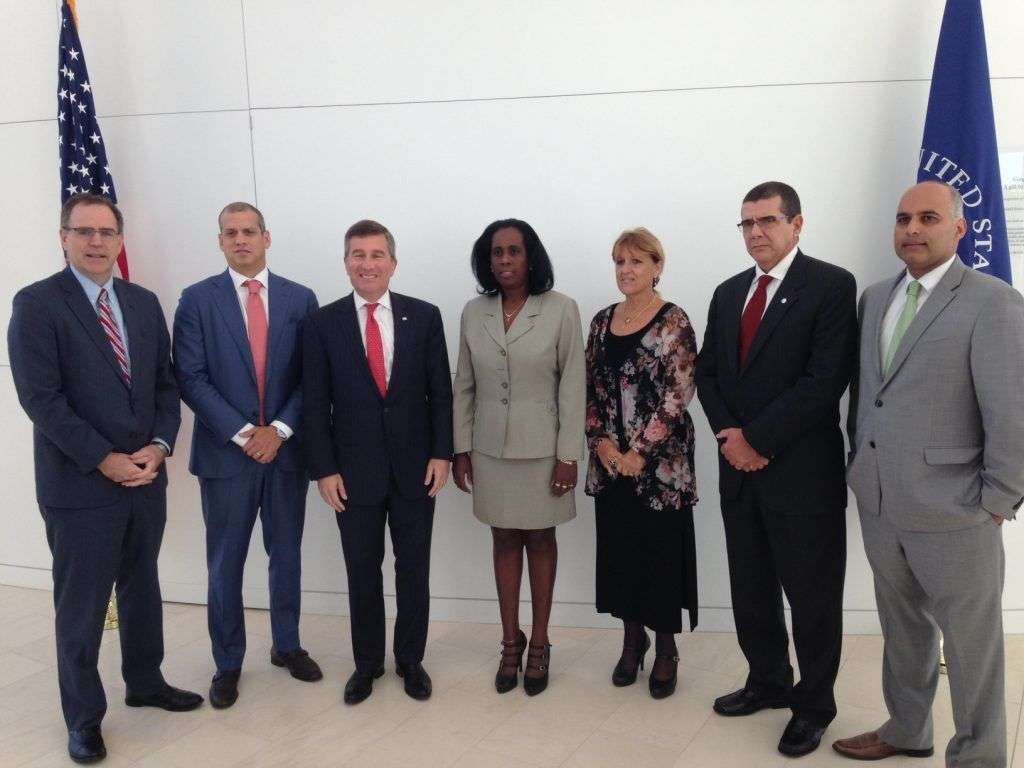The first meeting of the Bilateral Economic Dialogue between Cuban and U.S. officials was held this September 12 in Washington, where both delegations talked about topics of interest for a post-blockade context, according to the Cuban Foreign Ministry official site.
The Department of State reported in a press briefing that the topics discussed were, among others, “trade and investment, labor and employment, renewable energy and energy efficiency, small business, intellectual property rights, economic policy, regulatory and banking matters, and telecommunications and internet access.”
Similar meetings will be held on the road to rapprochement. In this one it was agreed to continue following up on specific topics and the creation of working groups that will meet periodically alternating the venues.

During this first meeting, the Cuban delegation insisted that the elimination of the blockade is a sine qua non condition to advance in economic, commercial and financial relations, and toward the total normalization of bilateral ties.
According to the figures given by Cuban Foreign Minister Bruno Rodríguez, the economic damages to Cuba amount to 4.68 billion dollars.
The voting in real time of the www.cubabloqueo.cu site until now account for 2,688 users who reject the U.S. restrictions officially imposed since February 3, 1962.
In her Twitter account, the General Director for the United States of the Cuban Foreign Ministry, Josefina Vidal, denounced other aspects that restrict the island’s social, economic and intellectual development, under the acts, regulations and executive orders imposed by the White House.
“Dozens of U.S. sites on the Internet cannot be accessed from Cuba,” Vidal said on the social media, and affirmed that some of the restrictions occur when trying to download programs for the development of software, Adobe products or other tools, and information for apps and computer security.
Cuban Foreign Minister Bruno Rodríguez had previously presented the Report on the Need to Put an End to the Economic, Commercial and Financial Blockade of the United States against Cuba, with which he rejected the consequences of this siege that “damages the Cuban people” and has “extraordinary ethical connotations.”
For the Bilateral Economic Dialogue meeting, the Cuban delegation was headed by Deputy Minister of Foreign Trade and Investment Ileana Núñez Mordoche, and the U.S. delegation by Deputy Assistant Secretary for Western Hemisphere Affairs John Creamer.
The Cuban delegation was also made up by officials from the Ministries of Foreign Trade and Investment, Foreign Affairs, as well as the Central Bank of Cuba, and the U.S. delegation by representatives of the Departments of Commerce, the Treasury, State, Agriculture, Transportation and Energy, among others; as well as the Commercial Representation Office.
The Bilateral Economic Dialogue is a mechanism created under the Cuba-U.S. Bilateral Commission to deal with economic, commercial and financial topics of mutual interest, including those that could come up in a post lifting of the blockade scenario.
Every year the international community backs Cuba and rejects the policy undertaken against it. Next October 26 the 25th voting on the aforementioned report will take place in the UN General Assembly.
Blockade and human rights
On the same day in which the meeting was taking place, several countries denounced before the Human Rights Council in Geneva the negative effects of the U.S. blockade imposed on Cuba, according to a diplomatic note that was circulated.
During the 33rd regular period of sessions of the Council, which will last until September 30, the ambassadors of Cuba, Venezuela, Namibia and Nicaragua spoke in favor of lifting these economic sanctions, in force for more than half a century.
Havana’s permanent representative at the Council, Anayansi Rodríguez, affirmed that “Cuba, whose people has suffered for more than 55 years an economic, commercial and financial blockade imposed by the United States, knows well the damages that the unilateral coercive measures cause.”
“This siege is the principal obstacle for the development of the Caribbean nation, and the economic damage caused for almost six decades of application amounts to 753.688 billion dollars, taking into account the depreciation of the dollar compared to gold,” she added.
Finally she said that “despite the fact that the government of President Barack Obama has introduced some modifications in the application of the blockade and has urged Congress to lift it, essential aspects of that policy are still in force.”










